Canned Vs Frozen Food: Everything You Need To Know
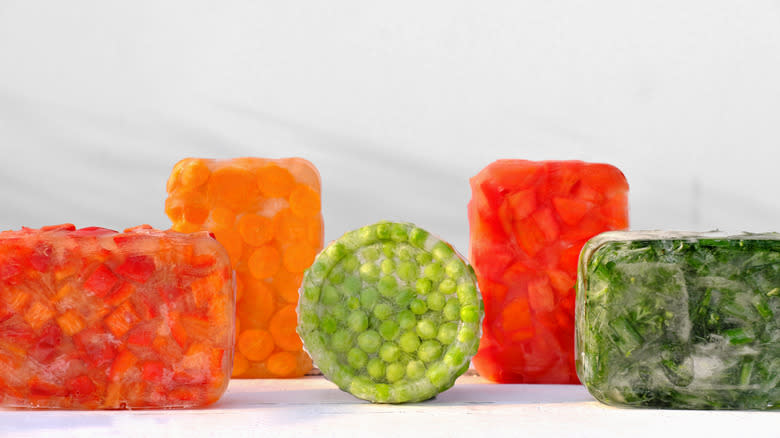
While fresh fruits and vegetables are always a good idea, they aren't always convenient. This is why store-bought frozen and canned foods are so great: They provide a cheaper way to get (almost) all the nutrition of fresh food, but in a form that can last months or even years with proper storage.
These two methods of preserving food are very prevalent in our society, and they have made getting your recommended daily serving of fruits and vegetables much easier. You can get your protein fill with canned or frozen meat and fish too, or even buy a full frozen meal, complete with dessert! But while both canned and frozen foods last longer than fresh, there are some differences between the two that are worth noting. One, for example, lasts longer, while the other retains more of the original food's nutritional value. Which one is best for you and your family? Read on to weigh them up.
Read more: 13 Canned Foods You Should Avoid At The Grocery Store
What Is Canned Food?
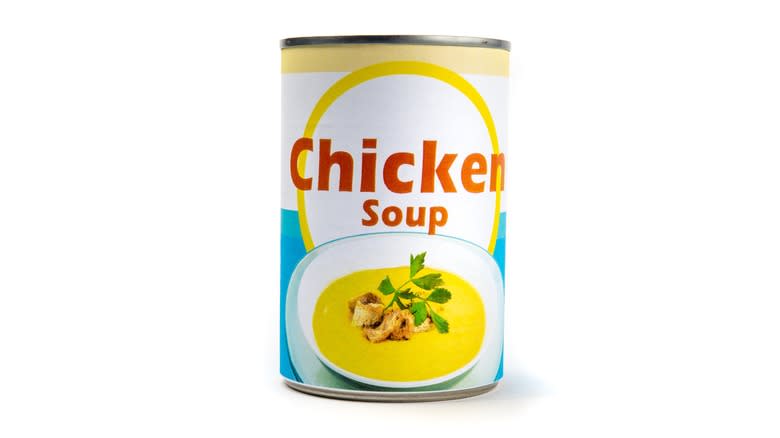
The invention of canned food started with a challenge from Napoleon. Yes -- we're serious. Way back in 1795, Napoleon announced that he would give a reward of 12,000 francs to anyone who could come up with a better way to preserve food. Nicolas Appert answered this call, and in 1809, he presented France with the idea of canning. The key, he explained, was to place food in a glass jar or bottle and seal it tightly, then heat it for a short time, which seals the jar as firmly as possible and keeps the food from spoiling.
At first, no one really knew why the food didn't spoil, they just accepted it. But 50 years later, Louis Pasteur discovered the reason why: The heat applied during the canning process kills the bacteria in the food, and the seal keeps other microbes from getting inside.
This storage method was expanded upon when England's Peter Durand patented the use of iron cans with a tin coating, which are more similar to what we use today. In fact, the canning process hasn't really changed much since then. Fruits and vegetables, for example, are washed and cut, peeled, or pitted. Some are blanched first as well. All are then placed into cans with water or other liquids. The lid is sealed onto the can, the can is heated to kill the bacteria, and then it's cooled quickly to complete the process. Voila: canned food. While it's still vital to know what mistakes to avoid when canning food at home, this really is a simple process most people can easily pull off.
What Is Frozen Food?
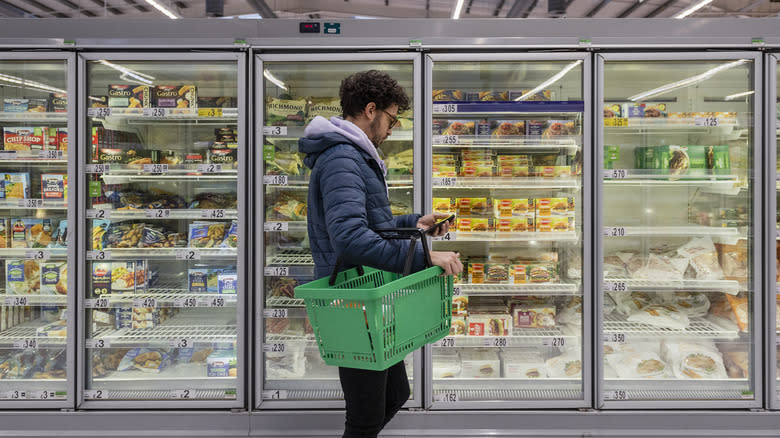
When it comes to frozen food, it's more important to know who perfected it, rather than who invented it. Frozen food had been available in the United States for around 50 years when Clarence Birdseye left his native Brooklyn to live in Labrador, Canada, circa 1912. While he was there, he observed the local Inuit people freezing their fish as soon as they caught them. When that fish was cooked later on, it tasted just as fresh as it would have if it had just been reeled in.
When Birdseye went back to America, he noticed that a lot of frozen fish was not surviving the trip from commercial fishermen's freezers to the store shelves. At that point in time, frozen food was not popular because when the food was thawed out, it was mushy and tasted bad as a result of a long, slow freezing process. Birdseye knew how to change this, though. He took the much quicker flash-freezing method he had learned up north and applied it to commercial foods.
It wasn't until World War II that Americans really started eating frozen food, thanks to working women at home needing something to cook up fast. But once it finally caught on, the trend stuck. Birdseye's method of flash-freezing food at the peak of its freshness for longer storage and better thawing is still used today.
Both Canned And Frozen Foods Can Be More Nutritious Than Grocery Store Produce
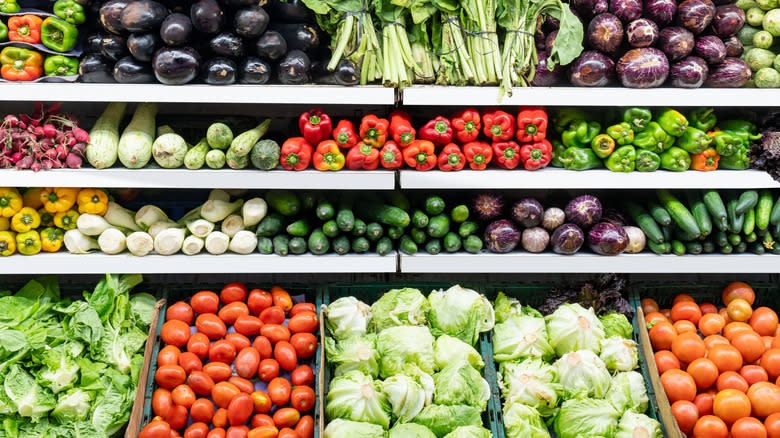
Haters will say that frozen and canned foods can't possibly be as nutritious as fresh. But they're wrong. In fact, some canned and frozen food is actually more nutritious than the produce at the grocery store.
"But how can this be?" ask the doubters. Well, it's true that there's nothing more nutrient-packed than a fresh-picked fruit or vegetable. But there is one thing you have to remember: The fruits and veggies you see at the supermarket are not fresh-picked. They were picked, then sorted, then packed up and put on a truck, which may have traveled for days before reaching the store where you eventually buy them. Food loses nutrients with every day that passes between its harvest and being eaten, so by the time that supermarket broccoli gets to you, it may already be a nutritional shadow of its former self.
Canned and frozen foods, however, are picked when they're at their freshest. Within hours, they're processed and preserved. This means that time stops for them while they're at their freshest and healthiest, unlike produce at the grocery store, which will continue to age until you eat it. One exception to this rule may be the local farmer's market, where fruits and vegetables may only be a day or two removed from the fields. But when it comes to commercial produce, it's very possible that frozen or canned foods have a higher nutritional value.
Frozen Food (Usually) Contains No Preservatives
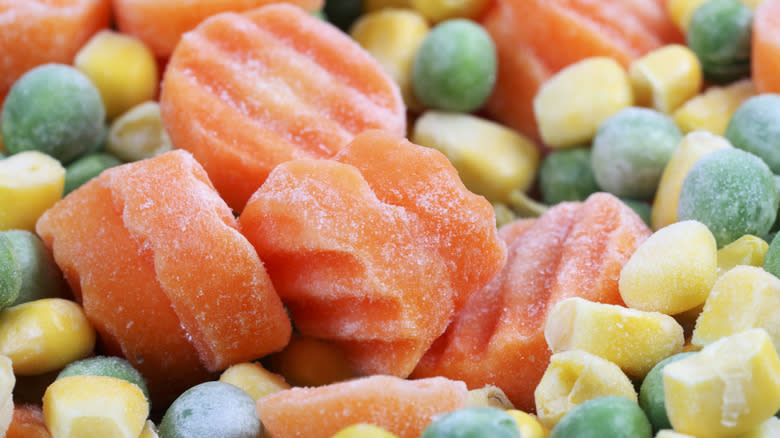
When you think about food preservation methods, something like curing meat may come to mind. In this case, substances are added to meat, like salt or nitrites, in order to change its chemical structure and make it last longer. This is not the case with frozen food.
Most frozen food is just that: frozen food. There is not much done to it in the way of processing, other than a quick dip in some boiling water to blanch the fruit or vegetables before packing them up. Because of this, frozen food is usually just as colorful, nutritious, and tasty as fresh food, because it essentially is fresh food. While there may be some brands that treat frozen fruit with ascorbic acid to keep it from spoiling or changing color and some others may add sugar, most frozen foods are simply food, frozen. Period. No preservatives are necessary to keep them from spoiling -- all they need are cold temperatures.
The high temperatures involved in canning food usually mean that canned goods have no need for preservatives either, but that doesn't mean that some don't have them. You should always be sure to check the label; some canned foods are high in sodium and may contain artificial preservatives like BHA/BHT or sodium benzoate to keep the food from spoiling.
Canned Foods May Be Less Nutritious Than Frozen
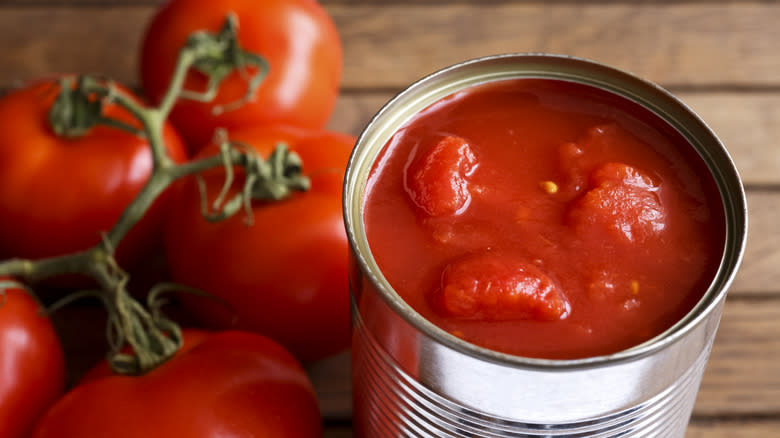
While both canned and frozen foods are preserved at the moment the food is freshest, canned food may lose more of the produce's original nutritional value than frozen food. In the interest of making sure the food is pathogen-free, food is subjected to a more strenuous preparation process when it is canned than when it is frozen. The fruit or vegetables (or meat or fish) are cut, chopped, and peeled as normal. Then they're put into cans with syrup, saltwater, brine, water, or other solutions, which lowers their nutrition level. That level lowers even further if you drain that liquid and/or rinse the vegetables and fruit before cooking them.
Then, you've got the heat. Every can is heated to very high temperatures to form a tight seal and sterilize it. But that heat also makes the food lose a bit more of its original vitamin and mineral count. There are two exceptions to this rule, however: Both tomatoes and pumpkin actually become more nutritious when they're canned, as they release higher levels of compounds like lycopene and other carotenoids.
Frozen food, on the other hand, involves much less processing. It is simply cooked very briefly in hot water, then packaged and frozen. This blanching process may still cause a reduction in the vitamins and minerals present (as well as the flavor level), but it's much slighter than the reduction canned food undergoes.
Both May Contain Added Salt And Sugar
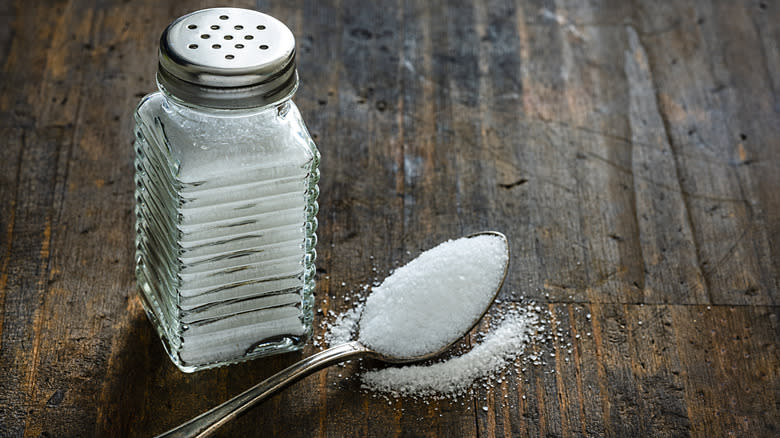
Regardless of whether you prefer to go with canned food or frozen, you should always check the label so that you're absolutely sure you know what you're getting. While it is less common with frozen food, both canned and frozen options can contain added sugar, and canned food is notorious for containing added salt.
As we now know, freezing and canning are opposite processes: One preserves food by cooling it down quickly, while the other preserves it by heating it up momentarily. Both of these processes are usually sufficient on their own to keep the food good for months or years, but sometimes a sugar syrup is added to canned fruit or even to frozen fruit to make it taste sweeter. Salt is also occasionally used as a preservative in canned food, but you can almost always find low-sodium options at the grocery store. Luckily, this is something that must be disclosed, so if you're concerned about it, all you have to do is check the ingredients list before buying.
Canned Foods May Have BPA
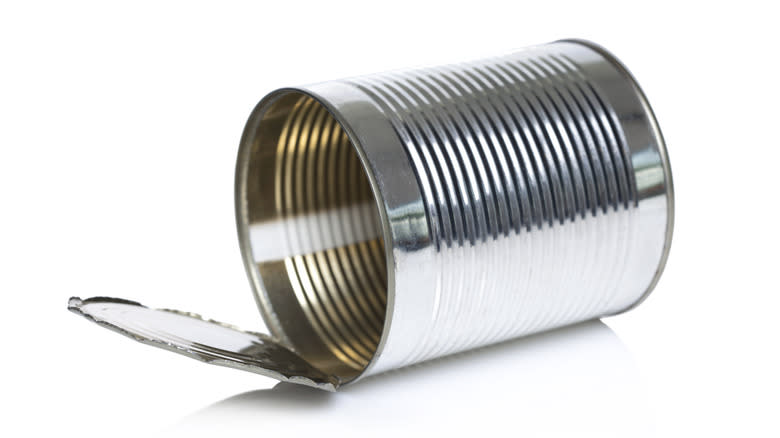
One potential downside of canned food is that it may contain BPA. BPA, or Bisphenol A, is a chemical component that is present in polycarbonate plastic. Sometimes this component is also used as a lining for metal cans. The reason behind this is that it can help to protect the can from acidic fruits and vegetables like tomatoes, whose juices may otherwise cause the can to rust or corrode over time.
Many worry that exposure to BPA can lead to conditions like diabetes, heart disease, and infertility, but the FDA assures customers that it is safe. While it is possible that people may consume or be exposed to BPA via the use of these cans, the levels are very low, as only small amounts of it may be transferred from the can to the food. The National Center for Toxicological Research has performed studies on the matter, and has shown no link to health problems from such low-dose exposures.
Frozen Food Often Needs To Be Thawed Before Cooking
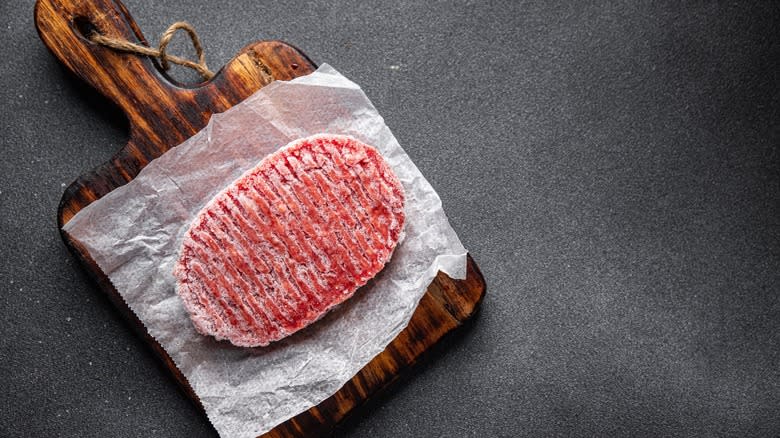
While some foods can be cooked straight from the freezer, most frozen things need to thaw out slowly before they can be cooked. Not paying attention to this is one of the biggest frozen food mistakes a person can make. Meat, especially, needs to be placed in the refrigerator so that it slowly warms up -- plopping it straight onto the counter is a big no-no. Freezing food halts the growth of any bacteria that may be on it at the time it goes into the freezer, but it does not kill said bacteria. When you defrost food in a warm place, the outside may get thawed out sooner than the inside, which wakes up the bacteria and allows them to start multiplying. Their numbers can increase exponentially before the middle comes to the proper temperature, making the whole thing unsafe to eat.
Canned food, on the other hand, is almost always ready to cook. Some of it may even be ready to eat right out of the can. While you may want to drain it if it has a syrup or brine, it can be kept at room temperature until it is open, meaning that there is no extra step to carry out before you start heating it up.
Canned Food Is Less Likely To Have Bacteria

Frozen food has a lot of pros, but one potential con is that it can potentially have more bacteria than canned food. You may think that bacteria and other organisms die when they're exposed to freezing temperatures, but in reality, they just go dormant. When the food comes back to room temperature, those pathogens can begin to grow again, leading to food spoilage or food poisoning if you don't cook the food to a proper temperature within a reasonable amount of time.
Canned foods don't have this problem. The whole point behind the canning process is to preserve food in a way that makes and keeps it free of bacteria. The heat applied during the sealing process eliminates any bacteria that may have remained on the food while it was being prepared. It also keeps any other bacteria from getting into the can. The only drawback to this is that the food may lose a bit of its flavor and nutrients -- but at least you'll know that the food is safe as long as the can is sealed.
Frozen Food Is (Usually) More Expensive
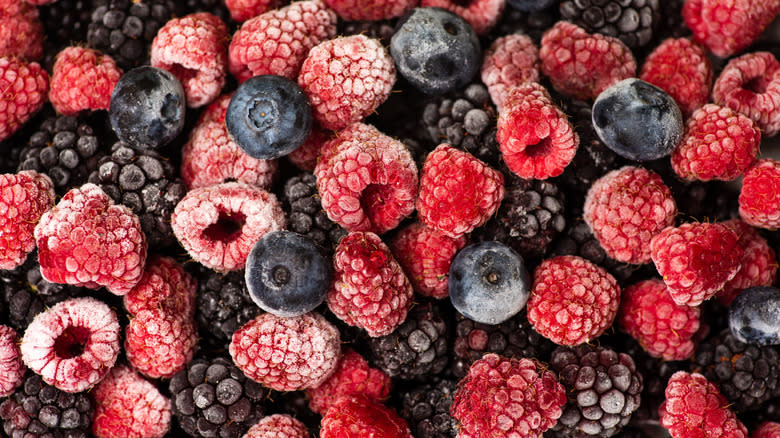
Now it's time for the million dollar question: Which type of food will save you the most money? Both frozen and canned produce are usually cheaper than their fresh alternatives. But when it comes down to frozen versus canned food, is there a big difference for your wallet? Absolutely.
According to The Boston Globe, canned vegetables can cost up to 80% less than fresh vegetables and 50% less than frozen vegetables. The USDA agrees, as the results of one of its studies proved that most vegetables were more expensive when they were frozen than when they were canned. "The least expensive way of purchasing vegetables is in canned form," they concluded. When it comes to fruit, though, things get a bit murkier. The Boston Globe claimed that the price points of fresh, frozen, and canned fruits were not so different from each other. But the USDA reported, "Canned fruit was never the cheapest way to eat fruit." Take it on a case-by-case basis.
Canned Foods Last Longer
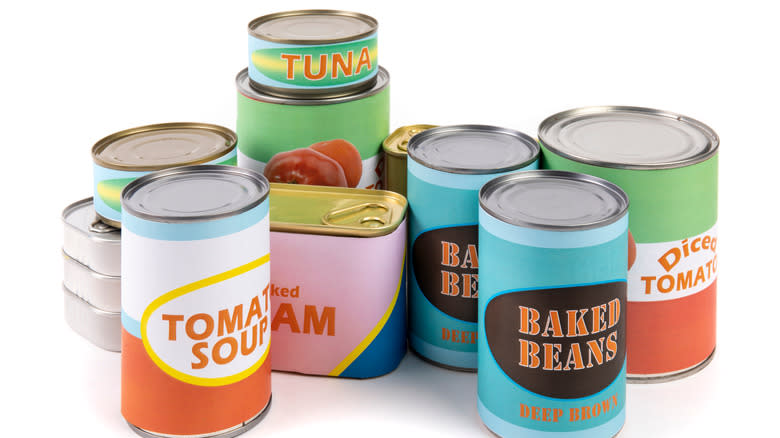
Aside from being more budget-friendly, the biggest reason why people buy canned or frozen food instead of fresh is that it can be stored for much longer. Both of these types of food can buy you plenty of precious time to eat your fruits, vegetables, and meat products -- but which one really has the most longevity?
In general, frozen vegetables should be eaten within eight months of the day you bought them. Frozen fruits can last a little longer, with the recommendation being to eat them within a year (except for citrus fruits like oranges and lemons, which should be consumed within four to six months). Frozen meat's shelf life varies, but is usually between four and 12 months. Some specific frozen foods also last a surprisingly long time, thanks to their specific make-ups -- coffee beans and French fries, for example, can last a full year.
Canned foods, however, have a much longer storage life. If kept in a dry, cool environment far from moisture or heat, most canned meats and vegetables can last from two to five years. Foods that are very acidic like tomatoes and pineapple can last 18 months. It's still good to know how to tell if your canned food has gone bad, but you have a much wider scope of time to work within. Bottom line: While both freezing and canning give you a larger window of time in which to eat your food, canned food gives you quite a bit longer.
Read the original article on Daily Meal.

